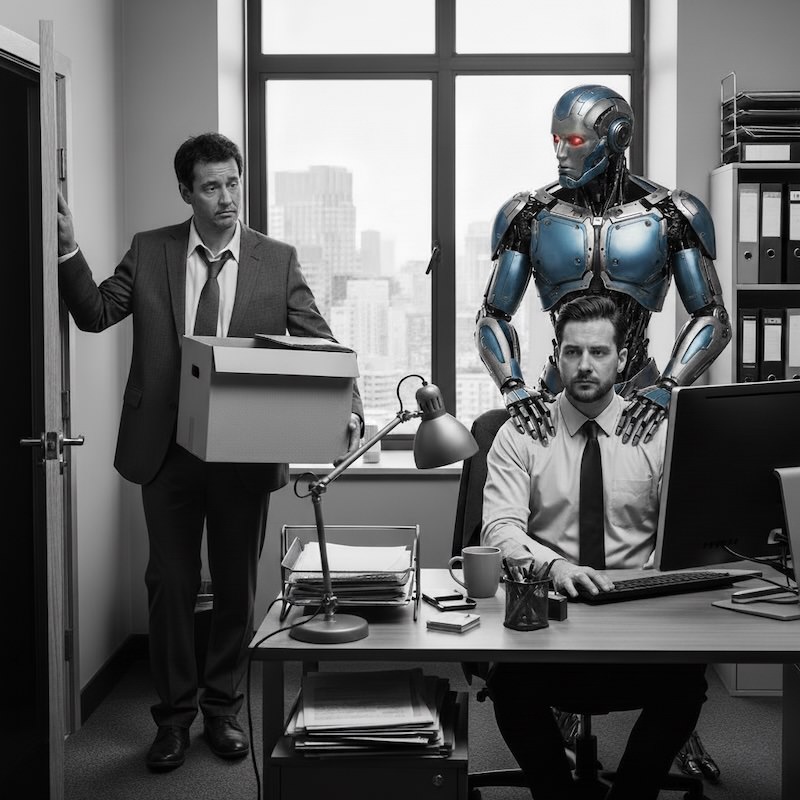We fear that which we do not understand. This well-worn saying seems particularly apt for the world of artificial intelligence (AI).
We’re all doomed
Judging by the regular gloomy headlines, and idle chatter at the water cooler, many people are clearly feeling apprehensive about the advent of AI. That one day we will turn up at work only to find our job has been taken over by a piece of technology. That somehow AI is something that is happening TO us, a harbinger of doom from the future sent to destroy us.
This fear is understandable. Fear stems from our brain’s survival mechanism, which primes us to be wary of things unfamiliar. We often become scared or apprehensive in the face of the unknown, with a creeping sense of insecurity or loss of control. This fear tends to induce a fixed mindset.
Yet here’s the thing. If we adopt that fixed and fearful mindset, we may risk inducing precisely the outcome we fear most. Our insecurity may cause us to push back on the use of AI. We may decide not to engage, to learn, or to adapt. We risk being left behind.
Mindset
There is an alternative. In her book Mindset, Dr. Carol Dweck explains the opportunities available to us when we adopt a growth mindset, and how new skills can be acquired through the application of curiosity, a willingness to learn, and a healthy dose of resilience. So how does a growth mindset apply in the context of AI?
For a start we need to understand what AI really is, as well as its limitations.
In brief
AI typically refers to the use of computer systems to perform tasks that require human intelligence, such as learning, problem solving and decision making. These systems can usually learn and improve performance over time. AI can process natural language, interpret images and consume vast amounts of data, often at incredibly fast speeds.
This makes it incredibly useful from a productivity perspective, enabling us to radically reduce the time it takes to perform mundane tasks. (Want that lengthy document summarised, or converted into a cool PowerPoint? Done in a flash. An idea for a new product rollout? All ready to go, with templates, suggestions and change management tips).
Equally there are limitations. Some, like Emily Bender, a linguistics professor at the University of Michigan, argue that while AI can generate human-like text based on statistical patterns in data, it lacks true semantic understanding.
What do you ____
An example. The Large Language Models (LLM) that form the basis of AI analyse vast amounts of data to learn patterns, enabling it to generate human-like responses and answer queries by predicting the next word in a text. Imagine this type of inference at an enormous scale: “It is a beautiful day in the _____.” The LLM will study a range of possible answers (park, city, neighbourhood, garden, etc.) and select the most relevant one given the context provided.
This is incredibly useful, enabling AI to handle certain work types incredibly quickly, and at unimaginable scale, but the same concept also makes it prone to occasional errors, referred to as hallucinations (picking the wrong word or even making up facts). Plus, while AI is incredibly powerful, it needs direction to be put to good use.
The human touch
That’s where we humans come in. We have agency. We can choose whether, how and where to use it, whether that is to boost our productivity, create images or learn something new.
The fact is that AI adoption rates are going through the roof. People are discovering new use cases every day. Right now, in your workplace, there are people experimenting, learning and practising curiosity. And that brings us to a fundamental truth, which is that evolution is not about the survival of the strongest, or the fastest, but those most responsive to change.
We have a choice
When we choose to adopt a growth mindset, we conceive of AI less as a threat, and more as a useful assistant. We can start to harness the power of this technology. We can start to conceive of AI as a tool, not a terminator. We can test, experiment, share what we have learned. We can adapt, learn and grow. Resilience and curiosity are our strongest suits as humans. Let’s use them.
As for the wider debate about whether AI will bring about a new industrial revolution, or is just a hype bubble waiting to burst, usually it says more about the commentator’s temperament than anything else. Predicting chaos and disaster? Sounds highly strung to me. Evangelising the dawn of a new era of productivity? Go easy on the happy pills.
The level-headed among us will be keen to learn and apply. If that’s you, then check out these FREE learning resources to help you get up to speed on all things AI.
- OpenAI Learn: learn.openai.com
- Microsoft Learn – AI Productivity: Microsoft AI Learning Hub
- YouTube – “OpenAI Official” channel
